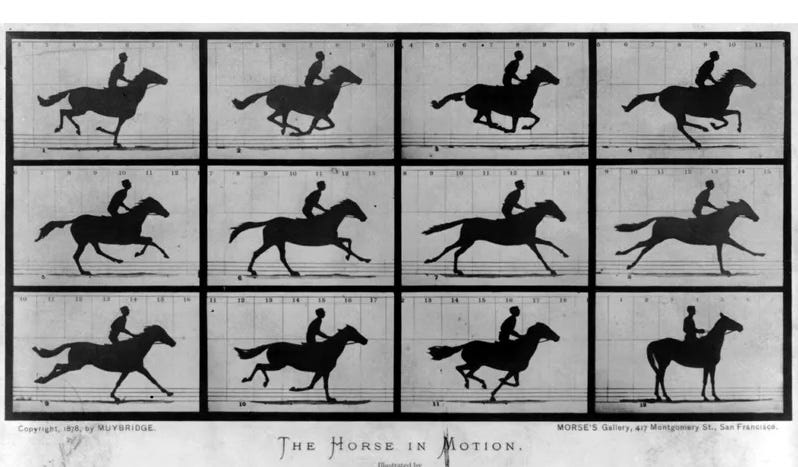

Discover more from The Obsolete Man
Spaceman Spiff at Postcards from the Abyss released an excellent essay yesterday that everyone should read. It explores the lines of thought that lead people to waste their lives on things that are ultimately unimportant. An important lesson for us all. It got me thinking about some of the metrics we use when we consider time and its value.
We really care about speed.
Faster. Faster than before. Faster than the other guy. At all times looking to shave a minute, a second, a nanosecond off of our previous time. We celebrate it.
Whether it’s an actual race won by the fastest person:
Or the fastest car:
Is that punt returner fast enough to make a miracle happen?
Can the pitchers arm keep them coming at 100+ MPH?
Which man can see the punches coming and react the fastest?
Who’s got the fastest processor to play the market a microsecond ahead of the competition?
Which communications network is fast enough to get the edge?
We even look for it in our modes of entertainment. Sure, photographs are nice and all, but what if you just blasted like 24 of them at me every second so that I could trick myself into thinking they were alive?
That was cool for a while, but after the pictures came alive, they really took their time getting to anything interesting.
Can you make it faster?
A little faster, maybe?
Just a bit more?
There we go.
The algorithm has spoken, and it dictates that short form is the best form. 45 second videos. 160 characters. Snappy commentary on complex issues. Sum it up in a sentence or two at most. Even better if you can just use a picture to respond.
Keep it moving.
Cut to the chase.
But why do we respond to this?
I’m certain the teams of engineers employed by social media and advertising firms to study and manipulate our attention could give us a breakdown of the mechanics involved. I won’t pretend to be an authority on the matter. But I believe at some fundamental level, we just really value speed.
Speed signals strength, dominance and security.
Speed to win the game or race.
Speed in our reactions to defend ourselves and others.
Speed of thought to solve problems and innovate solutions.
Speed is power and it’s valuable. Speed is attractive. I think for that reason we value it inherently. But there is a difference between speed itself and the signal it is sending. We can see this when we think about the layers of abstraction surrounding things which have sped up over time.
For instance, we naturally want to communicate with others. We used to do this by talking.
Then we abstracted that speech by developing writing. Suddenly, we could convey a message to anyone without having to be in their presence. This level of abstraction took something human from the interaction but allowed a much faster dissemination of information. Written texts could be shared and studied for generations and thus knowledge could accumulate and be built upon.
Then the printing press accelerated the ability to communicate via writing by orders of magnitude. The printing press also further abstracted the process of writing into the realm of the mechanical. Mass distribution of texts was now possible, and with it the spread of knowledge and literacy to wider audiences.
Later, the telephone allowed people to speak to each other from virtually any corner of the earth. This stage in the abstraction of basic communication is odd, because although we were back to square one as far as actually speaking to each other, we did not share a physical space and our voices were disembodied and came from a machine. The human element was now not just lacking but had been distorted entirely into a sort of facsimile of natural interactions. Still, the advantages offered would change the world.
Then came the advent of mobile phones and quickly email and texting were the most prevalent form of communication. The act of writing with an implement or of setting type on a press at least involved a person handling something tangible. We had now removed even that element and would simply tap a digitally projected keyboard to send out disembodied messages to anyone, anywhere in the world.
Now we've arrived at a point where a person doesn’t even have to type with their thumbs. They can use their voice to dictate a message to their phone, which will then turn their words into a digital message. Or, if they like, they can just sort of lazily drag their finger around the phone's keyboard and the device will do its best to figure out what you were going for and compose the message for you.
We’re about 20 different layers of abstraction from just speaking to people in person. This ever-progressing ability serves many useful purposes, but speed is the basis for every innovation.
We view speed as a sign of value, and so we end up looking for it everywhere, even where it doesn’t belong. We don’t want to waste time, after all. And yet, most of us waste time constantly by scrolling or being distracted by endless trivia. Maybe it’s not so much that we value time itself, but rather that we want to minimize the amount of time we have to spend exerting effort. This is an inversion of the notion that time spent being productive is inherently not wasted.
We don’t want to exert effort toward something we don’t value. That’s natural and understandable. And of course, we are usually much more willing to spend our time pursuing something meaningful to us. This becomes a problem when we no longer find meaning outside of entertainment and distraction. When we begin regarding these diversions as goals in and of themselves, we invalidate the entire equation.
Time saved by increased speed is only valuable if we are prepared to make good use of it. Otherwise, we simply devote a larger and larger share of our waking hours to meaningless, idle behaviors. Under the current paradigm, we create a great fortune for ourselves which we then immediately squander.
If we’re evaluating something like an athlete, a car, or a process, speed matters and is a good metric. If we then take that metric and assume that it should be the focal point of all progress, we miss the point entirely.
Of what use is an extremely fast sports car if you don't ever drive it anywhere?
What exactly are we speeding towards?
A future where nothing is ever required of us?
A time in which algorithms and Large Language Models do all of the reading, writing, and calculating for us?
Will we have we outsourced our thinking entirely in such conditions?
Where does that lead?
What’s the purpose of even being alive at that point?
Speed in development of processes and functions, when done simply for its own sake, is a race to our own irrelevance. We outsource our own utility and purpose over time.
This line of thinking might take us to great heights, but also leave us completely incapable of appreciating those heights. Imagine a futuristic space capsule, zooming across the cosmos through spectacular new environments. Now picture the humans in the capsule all being kept in isolated pods. Alive, but in a drug induced state of extended hibernation throughout the journey. Unable to experience, think about, process or convey the amazing things that surround them. That is the future that unthinking progress offers.
I’m not suggesting that we ought to return to some kind of agrarian society or shun technological progress. Technology and the development of new tools and processes are important and should be pursued. What I do think is that we far too easily adopt a framework for accepting premises without examining them. Faster and more convenient isn’t always better. In fact, the logical conclusion of that attitude is one in which we streamline ourselves out of a meaningful existence entirely.
The human experience requires something of us. Part of that is making and improving tools, but we should be doing that toward the explicit goal of making a better existence for ourselves. If we merely obsess over the idea of removing friction from our everyday lives, we ultimately remove any meaning along with it. Before we worry about saving time, we should first make sure we have something worth devoting it to.
Subscribe to The Obsolete Man
“I'm a human being, I exist. And if I speak one thought aloud that thought lives, even after I'm shovelled into my grave.”





























Very well put... We absolutely get lost in moving faster, with little contemplation of what we're actually moving towards.
I'm moving back to America in a few months and I'm looking forward to spending a not insignificant amount of my time planting trees on my dad's property. The crazier the world gets, the more I want to spend time outside doing something ancient.
I think what we are experiencing is an acceleration. It isn’t just the speed in which we are moving, but the rate of acceleration. The same way you do not notice your body traveling 500mph in an airplane, but are aware of the rate of change towards cruising speed during takeoff.
With no interval or wedge to contemplate what we are even moving towards leaves us in an ever present acceleration. Could it be that speed is used as a proxy for a “process” or even “progress?” Perhaps reflection or meaning is a way to avoid being hurled into the future with no brakes.